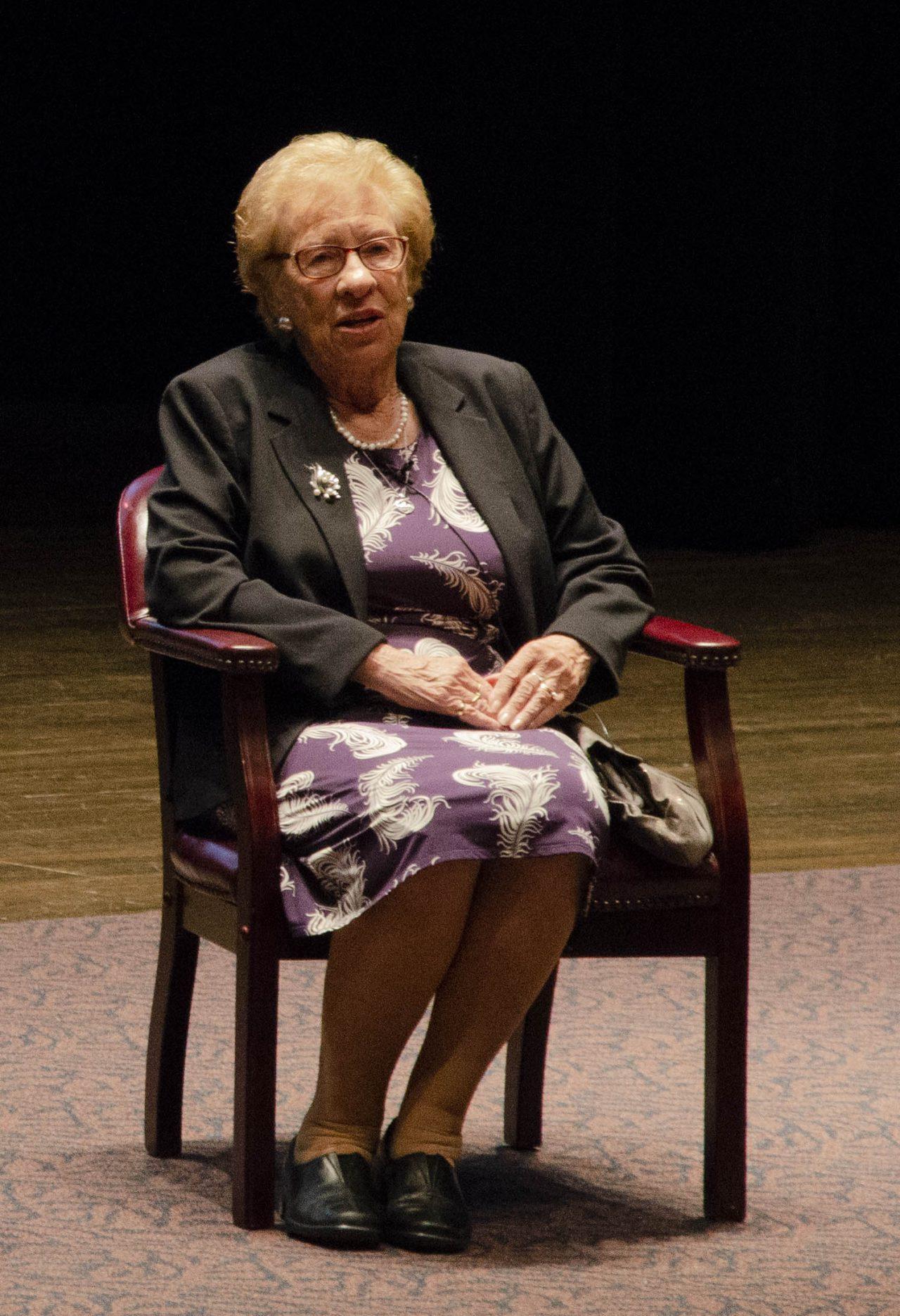Photo by Julia Weis
Eva Schloss speaks with the gravity of a woman who has lived a thousand lifetimes in one, a woman who was wise long before she was old. Her voice is soft and yet it is the loudest I have ever heard. As her story resounds through the auditorium, a hushed, heavy weight seems to press down upon the audience, and I find myself forgetting to breathe.
Eva Schloss is the ninety-year-old stepsister of Anne Frank and a Holocaust survivor who came to speak at Trinity on March 19. During World War II, her family hid in Amsterdam for two years until the Nazis discovered them in May of 1944 and transported them to Auschwitz. Eva recalls that she and her mother had just sat down to a special breakfast − an egg − the morning Nazis soldiers took them because it was her fifteenth birthday.
“I cannot even say we were treated like cattle [on the trains to Auschwitz] because I remember a few years ago, sheep were being transported on a train in France and people stood alongside the tracks and shouted for them to stop, that it was inhumane … but no one did that when the Jews were taken away.” After four days on the train, they arrived, and Eva recalls them separating men and women. Her father, who she says was not an emotional man, took her hand and, “with tears in his eyes, apologized because he could not protect us anymore.”
Eva describes the darkness of one day in particular, several months after arriving at the concentration camp. They were being forced to walk barefoot through the snow; many with open, weeping sores on their feet. Eva thought at the time that her parents were both dead, and she recalls an empty hopelessness swallowing her so completely that she did not know how much longer she wanted to try to survive.
And then came the liberation. After the war, Eva recalls sinking into a deep, oppressive depression, kindled and kept alive by hatred. Her relationship with God had been completely shattered during her time at Auschwitz. “All we could do in the camps was pray to God,” Eva said. “But it seemed that he did not care or was perhaps not all-knowing. The camps were terrible, but you had a purpose each day: to try and survive … but I came out of the camp with no purpose, and I no longer believed in humanity.” It was Otto Frank, a man who had lost his entire family, who told Eva she “must not live with hate.” If a man who had lost everything had the capacity within himself not to live with the hatred, Eva realized she could as well. She became a photographer, got married and had three daughters; “life,” she says, “carries on.”
For many years, Eva could not bear to talk about what she and thousands of others had experienced. The world did not seem to want to know. However, after several years, she recognized the importance of speaking out even as it hurt. “Too many people,” she says, “millions of people, have been killed in this terrible war [of hatred], and it still carries on today.” She recognized in this world a problem that ran deep, deeper even than the evils of Nazi Germany. Generations of today may look back and relegate the horrors of the Holocaust to the past. Horrors like that, we think, were the byproduct of a world that was younger and more broken than the one we live in today.
But a Holocaust survivor sits in front of us, and she tells us how the then-subtle changes she saw during the rise of Nazi Germany are eerily similar to changes she sees today. She tells us how, in the beginning, the measures against the Jewish people were simply degrading; it began with hate speech, but hate speech then escalated to violence. A week ago, the world saw this same pattern Eva saw 80 years ago in the New Zealand Christchurch shooting.
I cannot imagine the incredible strength one must possess to be able to find joy and light in this world after experiencing the unspeakable horrors of the Holocaust, and the inconceivable pain she must feel to see the hate that caused it still festering and growing in this world today. If we allow hate and white nationalism to seed itself into our narrative, we are disrespecting every victim of hatred and prejudice in an unimaginable way. If words can create so much hate in this world, they can certainly create just as much love; it is a great deal easier to love than to hate. Do not allow yourself to look back in 50 years and think, “I could have done more;” do not allow yourself to be complicit; do not allow yourself to be silent. And if you are silent right now, you are complicit.






